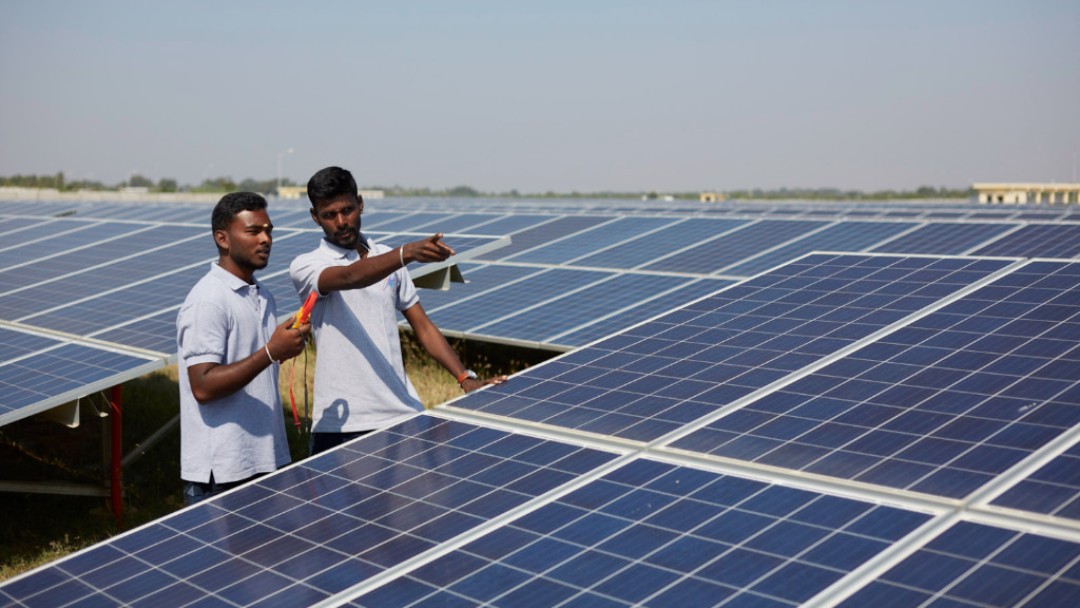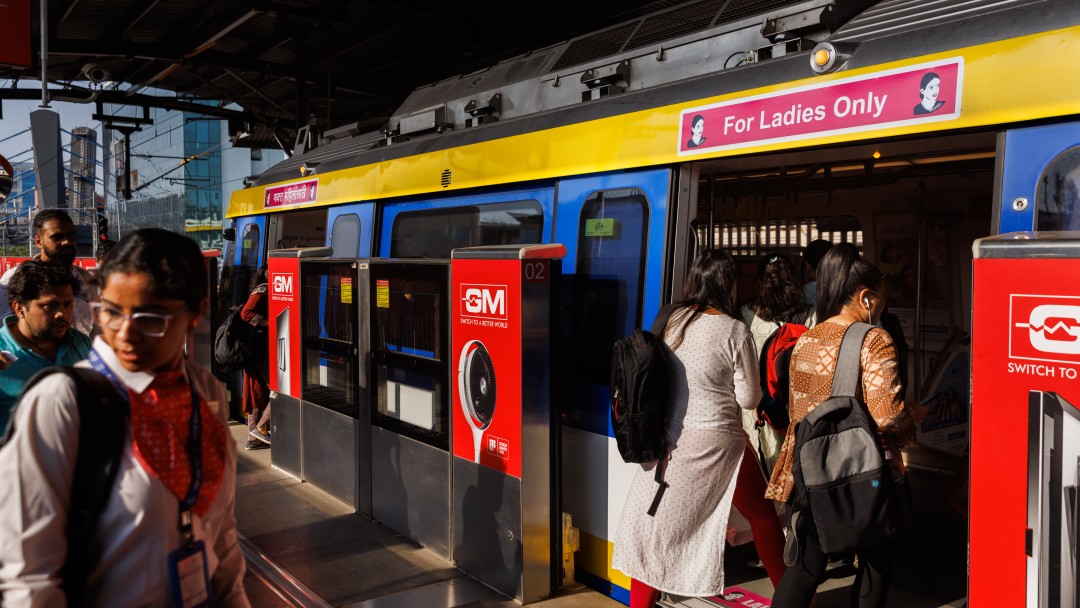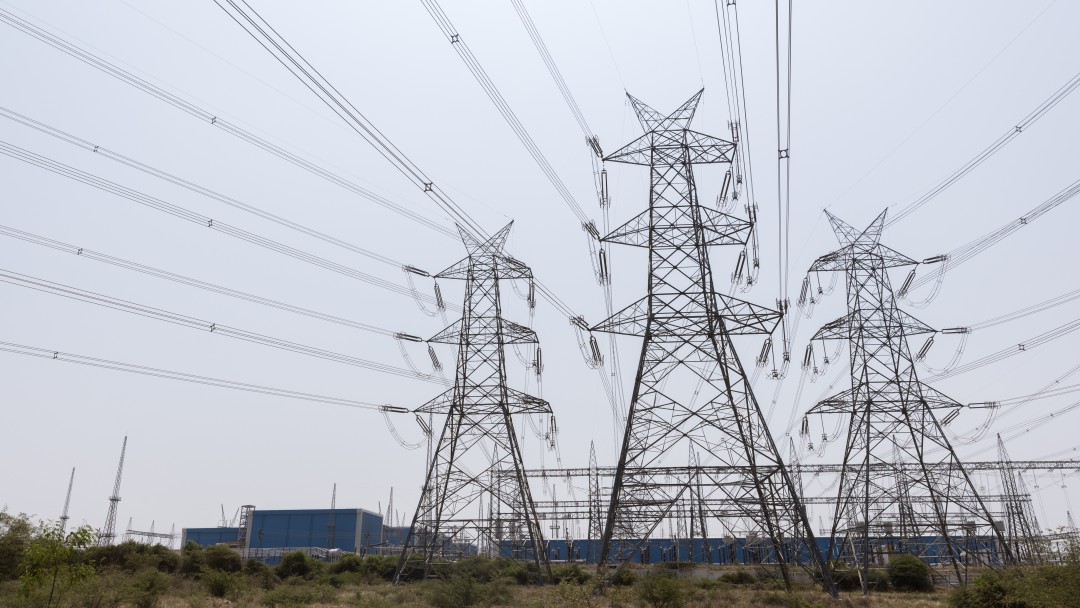News from 2023-12-20 / KfW Development Bank
A big boost for India's climate goals
Germany finances environmentally friendly development with EUR 1.5 billion

KfW signed a huge portfolio of several contracts totalling one and a half billion euros with India on behalf of the German Government before the end of the year. These are mainly reduced-interest development loans. The projects range from a new, integrated suburban railway system in Bengaluru to improved waste disposal in Mumbai and investments in solar plants, all of which have one thing in common: they support India to achieve its climate targets.
The suburban railway in Bengaluru alone accounts for half a billion euros, which is intended to improve public transport in the city with a population of more than eleven million. There are plans for 149 kilometres of suburban railway line with 58 stations and the construction of two railway depots. When the suburban railway is completed, it will transport around 1.4 million passengers a day. Thanks to an integrated public transport system, these passengers will be able to quickly transfer to other modes of transport such as metros, buses, rickshaws and trains from the main long-distance railway stations. Special attention is paid to the needs of female passengers during planning.
The "City Investments to Innovate, Integrate and Sustain" programme, CITIIS 2.0, is also supporting to improve living conditions in cities. KfW is financing measures in several selected cities with EUR 100 million. For the first time, "Team Europe" is taking action here, i.e. three European institutions, namely KfW, the Agence Française de Développement (AFD) and the EU Commission, are jointly financing the project.

Circular economy for Mumbai
Mumbai, the largest city on the subcontinent, is severely affected by climate change. Heavy rainfall is becoming more frequent, the heat is becoming more extreme and rising sea levels are having a noticeable impact. Funding for several measures totalling EUR 100 million is intended to support the metropolitan region adapt to climate change. Better disposal of the megacity's waste is also being supported. Circular economy, biogas and recycling should contribute to reducing the mountains of waste.
Rishikesh in northern India is also being supported in sustainable urban development. Here, KfW is providing EUR 100 million to improve water supply and wastewater disposal as well as erosion and flood protection and urban mobility.
Reducing electricity losses
India currently emits the third highest amount of greenhouse gases after China and the USA. Climate protection on the subcontinent therefore has global significance. At the international climate conferences, the country pledged to significantly reduce its emissions and increase the share of non-fossil fuels in energy generation to 50% by 2030.
The expansion of renewable energies is complemented by the modernisation of the electricity grid. Together with the Asian Development Bank (ADB), KfW Development Bank is supporting India in making the distribution grids more efficient and effective, avoiding electricity losses and thus making it easier to supply the population with sustainably generated energy. To this end, KfW is financing a reduced-interest loan of EUR 200 million in the form of a policy-based programme financing (so-called "policy-based loan") as part of the "Climate-friendly energy supply" project. In the case of a policy-based loan, certain reform steps must be implemented before KfW disburses the funds. The programme supports the Indian reforms in the electricity distribution sector – an important prerequisite for the expansion of renewable energies.

Another project is also aimed at reducing electricity losses in the grid. KfW is providing further EUR 200 million for this purpose, which will be channelled to electricity distribution companies via the Indian state-owned financing institute REC. Improved grid control will ensure a secure, low-loss and environmentally friendly energy supply in the future. This is because only high-performance grids will make it possible to transmit electricity from renewable energies to economic centres and households.
India has many resources to generate green electricity, but only utilises a fraction of them. KfW is now providing EUR 70 million for the construction of solar plants. The plan is to build a capacity of 510 MWp, which will save around 648,000 tonnes of greenhouse gas emissions per year. KfW is providing a further EUR 130 million to support solar plants in the state of Maharastra.
Strengthening the energy efficiency of small companies
Micro, small and medium-sized enterprises account for 90% of all industrial companies in India. They employ more than 100 million people. In most cases, these companies are too small to successfully apply for a loan. This makes it difficult for them to implement energy efficiency measures. Together with the Small Industries Development Bank of India (SIDBI), KfW is now providing around EUR 140 million to enable these companies to make energy-efficient investments.
What all the projects that have now been agreed have in common is that they help to reduce greenhouse gas emissions, strengthen resilience to the consequences of extreme weather events and promote sustainable urban development. All of this contributes to achieving India's climate targets.

Share page
To share the content of this page with your network, click on one of the icons below.
Note on data protection: When you share content, your personal data is transferred to the selected network.
Data protection
Alternatively, you can also copy the short link: https://www.kfw-entwicklungsbank.de/s/enzBWrMC.DBOA
Copy link Link copied